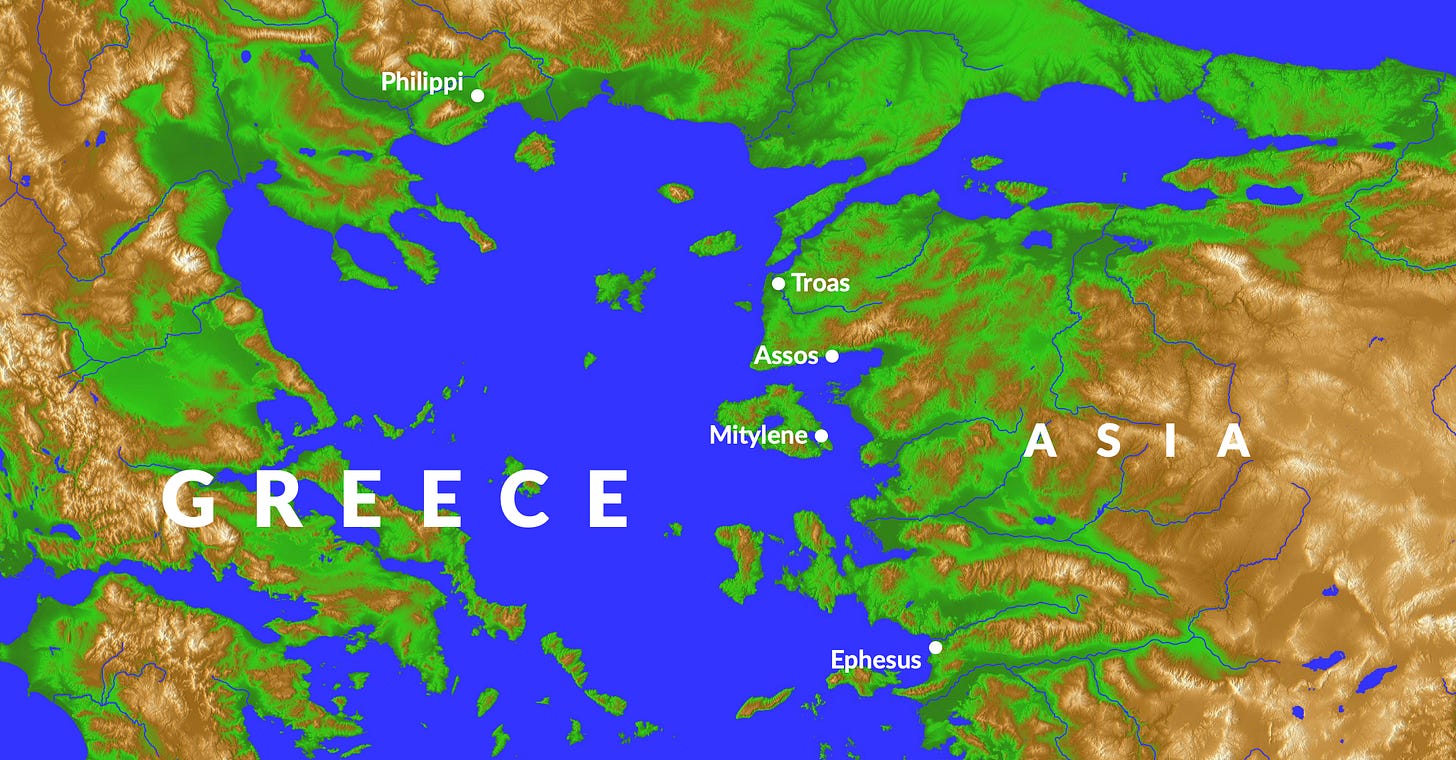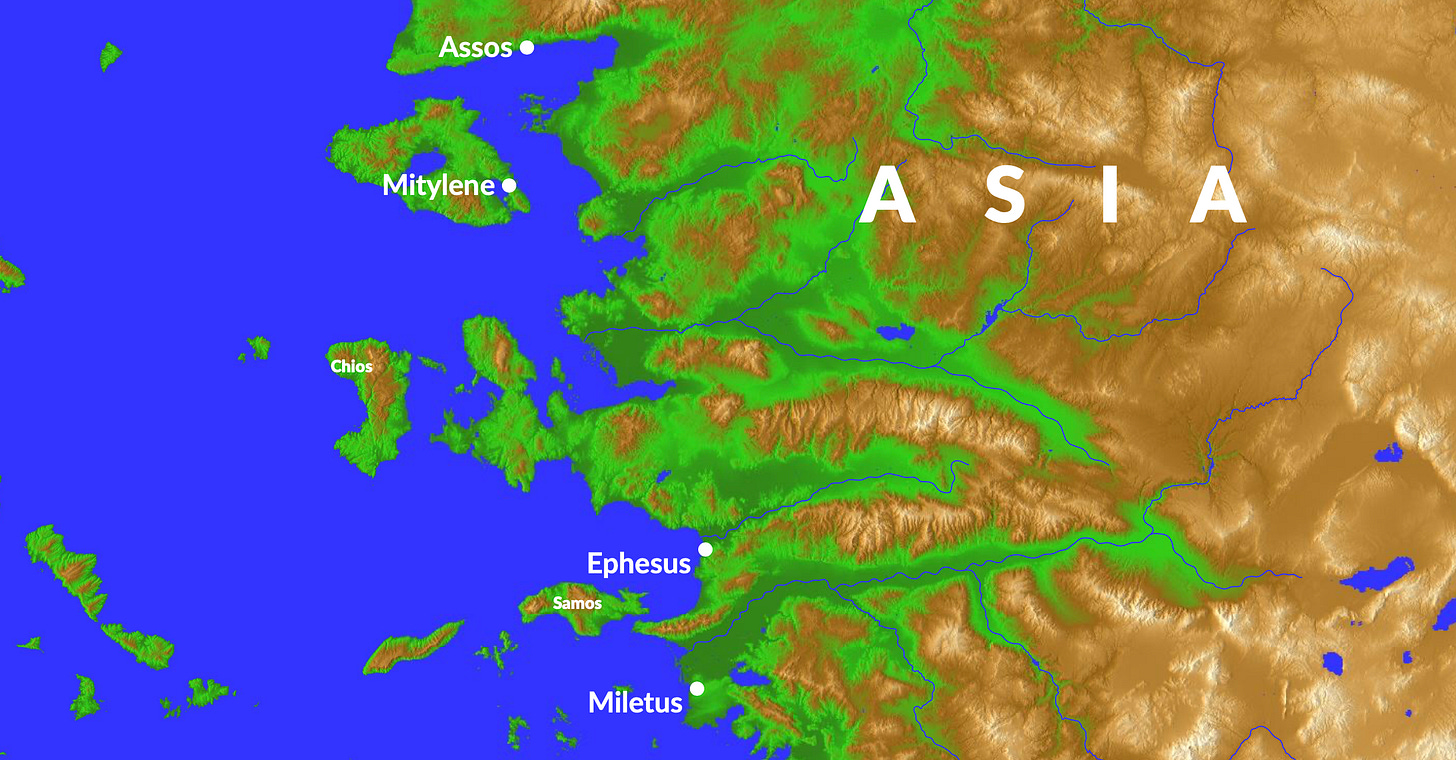Daily Scripture Reading Acts 20:2-24
It is very tempting for western Christians to be fair weather missionaries, meaning we do all we can to avoid getting arrested, abused, or killed for doing ministry. If a missionary knows he will be arrested or killed if he goes to certain places, he tends to avoid those places.
We have seen in the book of Acts that sometimes Paul left cities when he was in danger and sometimes he did not. Today’s passage gives us a little insight into why Paul sometimes allowed danger to surround him and what drove him to persist in doing ministry, even when it meant being afflicted.
Yesterday, we read in Acts 19 that Paul’s ministry in Ephesus was so successful, the craftsmen who made shrines for the worship of Artemis were fearful of losing their income. They started a huge uproar in Ephesus, which went on for hours. After the shouting had finally ceased, Paul left Ephesus to go to Macedonia.
Acts 20:2 And when he had gone through those districts and had given them much exhortation, he came to Greece.
Acts 20:3 And there he spent three months, and when a plot was formed against him by the Jews as he was about to set sail for Syria, he decided to return through Macedonia.
Here we see that Paul avoided a dangerous situation.
Acts 20:4 And he was accompanied by Sopater of Berea, the son of Pyrrhus, and by Aristarchus and Secundus of the Thessalonians, and Gaius of Derbe, and Timothy, and Tychicus and Trophimus of Asia.
The riot occurred in Ephesus. Then Paul traveled through Macedonia to Greece. After three months in Greece, there was a threat against Paul so he decided to go back through Macedonia and on to Syria. Syria was 800 miles / 1,300 km away.
Verse 4 lists seven men who accompanied Paul. One of them was from Berea, another was from Derbe, two were from Thessalonica, and three were from Asia. This tells us Paul had assembled a group from a broad geographical area. Furthermore, it indicates his ministry was not merely proclaiming the gospel himself, he also mentored and trained others to do ministry. The men he was training were from his mission field, not from his home area.
Acts 20:5 But these had gone on ahead and were waiting for us at Troas.
Note the pronoun “us”, which refers to Luke, the author of the book of Acts. Luke joined up with Paul at this point in Paul’s travels.
Acts 20:6 And we sailed from Philippi after the days of Unleavened Bread, and came to them at Troas within five days; and there we stayed seven days.
Notice the detail that they sailed from Philippi after Unleavened Bread. That will be useful information later in this passage.
Paul had been in Greece. Then he traveled through Macedonia to Philippi and got on a boat at Philippi to go to Troas. It is about 125 miles / 200 km from Philippi to Troas and that journey apparently took about 5 days.
Acts 20:7 ¶ And on the first day of the week, when we were gathered together to break bread, Paul began speaking to them, intending to leave the next day, and he prolonged his message until midnight.
Acts 20:8 Now there were many lamps in the upper room where we were gathered together.
Acts 20:9 And there was a young man named Eutychus sitting on the windowsill, sinking into a deep sleep. And as Paul kept on talking, he sunk into that sleep and fell down from the third floor and was picked up dead.
Acts 20:10 But Paul went down and fell upon him, and after embracing him, he said, “Do not be troubled, for his life is in him.”
Acts 20:11 And when he had gone back up and had broken the bread and eaten, he talked with them a long while until daybreak, and then left.
Acts 20:12 And they took away the boy alive, and were not a little comforted.
Acts 20:13 ¶ But we, going ahead to the ship, set sail for Assos, intending from there to take Paul on board; for so he had arranged it, intending himself to go by land.
Acts 20:14 And when he met us at Assos, we took him on board and came to Mitylene.
It was 33 miles / 53 km from Troas to Assos via land. That was a 1-2 day journey. It was about the same distance to sail from Assos to Mitylene.
Acts 20:15 And sailing from there, we arrived the following day opposite Chios; and the next day we crossed over to Samos; and the day following we came to Miletus.
Acts 20:16 For Paul had decided to sail past Ephesus so that he would not have to spend time in Asia; for he was hurrying to be in Jerusalem, if possible, on the day of Pentecost.
Verse 6 told us Paul and his group left Philippi after Unleavened Bread. Verse 16 tells us Paul wanted to be in Jerusalem on Pentecost. Pentecost is 50 days after Unleavened Bread. That meant it was possible to travel from Greece to Jerusalem in 7 weeks, but they had to keep moving. Paul had spent two years in Ephesus, so if he had visited the city of Ephesus, it would have been very easy for him to get delayed and not make it to Jerusalem by Pentecost.
From Mitylene, Paul sailed past the islands of Chios and Samos, which meant he also sailed past Ephesus, and landed at Miletus. It was at least 120 miles / 190 km from Mitylene to Miletus.
Acts 20:17 ¶ Now from Miletus he sent to Ephesus and called to him the elders of the church.
Acts 20:18 And when they had come to him, he said to them, ¶ “You yourselves know, from the first day that I set foot in Asia, how I was with you the whole time,
Acts 20:19 serving the Lord with all humility and with tears and with trials which came upon me through the plots of the Jews;
The word “serving” tells us Paul’s approach to ministry. He considered himself a servant of the Lord. The words “tears” and “trials” tell us he served despite personal hardship.
Acts 20:20 how I did not shrink from declaring to you anything that was profitable, and teaching you publicly and from house to house,
The phrase “did not shrink” lets us know Paul was bold in his message despite the opposition he faced.
Acts 20:21 solemnly testifying to both Jews and Greeks about repentance toward God and faith in our Lord Jesus Christ.
The words “repentance” and “faith” communicate the content of Paul’s message. Repentance is a crucial component of salvation.
Acts 20:22 And now, behold, bound by the Spirit, I am on my way to Jerusalem, not knowing what will happen to me there,
Paul was “bound by the Spirit”, meaning the Spirit had told him to go to Jerusalem.
Acts 20:23 except that the Holy Spirit solemnly testifies to me in every city, saying that chains and afflictions await me.
Note the words “chains” and “afflictions”. Paul was on his way to Jerusalem even though he knew he would be chained and afflicted.
It is very tempting for western Christians to be fair weather missionaries, meaning we do everything we can to avoid getting arrested for doing ministry. If a missionary knows he will be arrested if he goes to certain places, he tends to avoid those places.
In many ways that is logical, and might be prudent, but we see that Paul did not do that. Paul knew chains and afflictions awaited him in Jerusalem. He did not avoid that fate, he went towards it. He went because he knew the Spirit wanted him to go.
This should prompt modern Christians to ponder at what point we should be willing to go to jail as a servant of Jesus.
Acts 20:24 But I do not make my life of any account nor dear to myself, so that I may finish my course and the ministry which I received from the Lord Jesus, to testify solemnly of the gospel of the grace of God.
This verse succinctly summarizes Paul’s attitude. He had received a ministry from the Lord Jesus. He was willing to do whatever it took to finish his course.
Why did Jesus put you on earth?
What opposition, abuse, persecution, or danger do you face as you do that which God desires you to do?
How close are you to having Paul’s attitude, meaning you know your assignment from God and you are willing to finish your course, no matter what obstacles or personal pain you experience as you finish your course?
Thanks for visiting Bible Mountain. If you have already joined my email list, thank you and please tell others about Bible Mountain. If you have not joined my email list yet, please do so now. In order to join, go to Bible Mountain dotcom, click on subscribe, and that will take you to a page where you can sign up. Your email address will not be sold nor given away. Once again, thanks for visiting Bible Mountain.
“Scripture quotations taken from the (LSB®) Legacy Standard Bible®, Copyright © 2021 by The Lockman Foundation. Used by permission. All rights reserved. Managed in partnership with Three Sixteen Publishing Inc. LSBible.org and 316publishing.com.”




